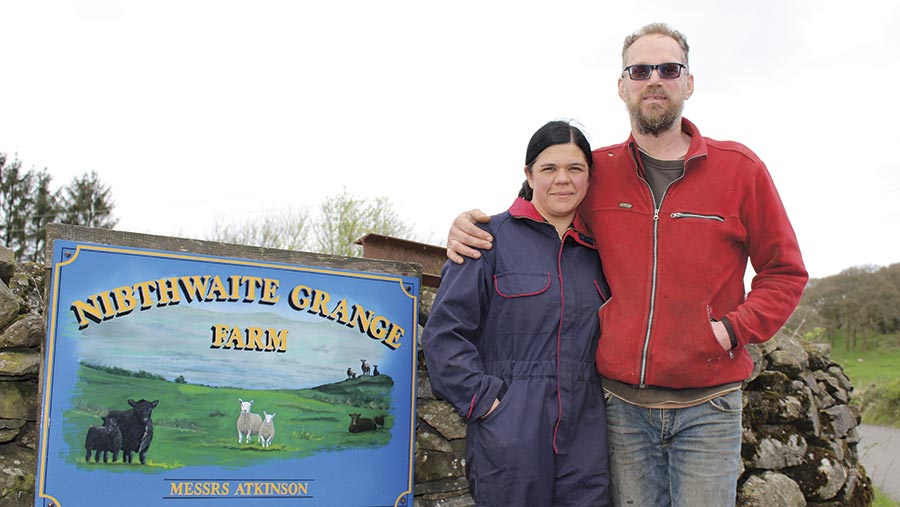How selling mutton and hogget is benefiting upland sheep farm
Producing hogget and mutton instead of lamb is allowing John Atkinson and his partner Maria Benjamin to match their production system with the land’s capabilities.
The couple are also achieving big premiums of up to £9/kg by developing different sales outlets for their produce.
The farm, at Nibthwaite Grange Farm, Cumbria, has 425 mainly Lairg-type Cheviot ewes and 20 rare breed Castlemilk Moorit ewes.

John Atkinson and Maria Benjamin are selling hogget and mutton © Sarah Alderton
The land largely consists of the Lake District fells surrounding Coniston, with some lowland grazing. This can mean that producing lambs solely off grass is difficult.
See also: Making more from mutton
Instead, they sell offspring from the flock as mutton and hogget, rather than pushing lambs to hit heavy weights at a younger age.
“The earliest we sell stock is nine months, as hogget,” explains Mr Atkinson.
Meat aged nine-18 months is marketed as hogget, and anything over that as mutton.
Half of the lambs produced on the farm are either retained or sold for breeding (most of the females), 40% are sold live through the market as hogget or mutton, and the other 10% is sold deadweight to either restaurants or through their internet box meat scheme.
Marketing of meat
“Having the different outlets for our meat means we can market the produce depending on what we have available,” explains Ms Benjamin.
All produce sold through restaurants and online is marketed at £7/kg, regardless of the cut of meat. The rare breed Castlemilk Moorit is sold at £9/kg. They have been supplying meat to the Steam Bistro in Coniston and the Old Stamp House in Ambleside.
The demand for the meat from the restaurant trade fluctuates throughout the year, but through the Christmas and New Year trade, Steam Bistro was taking five carcases a week.
“The restaurant trade varies, depending on the chef’s menu and what the customers want,” says Ms Benjamin.
Therefore, having a range of sales avenues is key.
“The variety in the business means that if the restaurants only want rolled shoulders and joints, the other parts of the carcass can be sold through the meat box scheme,” she adds.
Private customers can order meat online, with an overnight courier used to ship the meat to the buyers, many of whom are based in London.
“A lot of our custom is word of mouth. We had one person order meat from us in London and now we have about eight customers from the same street. People like the ethical nature of our business and want to know where their meat comes from,” says Ms Benjamin.
The beauty of producing hogget and mutton meat is that should the demand be there for hogget they can supply that, but if they have to hold onto the stock for a few more months they can market the meat as mutton.
The low-cost nature of their system means that it isn’t costing them any more to hold on to stock.
Management
The aim is to fatten the sheep off grass, with supplement only provided to make up for grass shortfalls.
“It’s important when you are selling hogget and mutton that there is new meat laid down just prior to selling, and feeding a little bit of concentrates in the last couple of weeks gives this,” explains Mr Atkinson.
Most of the Cheviots lamb on the fell, with the exception of older ewes and twin bearing ewes, which are brought down to the lowland to lamb indoors. Those lambing on the lowland receive haylage in addition to grass.
Males are castrated at birth, as it is mostly males that are sold as hoggets and mutton; the females are sold as breeding stock or retained as replacements.
Those lambing on the fell stay there until September. At that point, the lambs are weaned and brought down to lowland pastures where they graze on a neighbouring dairy farm over the winter. The hoggets are then sold from February onwards.
Mr Atkinson says the average liveweight is 40-42kg for the hoggets and 50kg for mutton, with the hoggets killing out at 20kg.
“The Cheviots are grading mostly Rs and Us and the Cheviot Mules are mainly Rs,” he says.
Meat is hung for 10 days at the local abattoir, Denny’s, in Levens.
Prices being achieved through the ring are also encouraging, with hogs often topping North West Auctions.
“We are averaging about £77.50 for 40kg hoggets,” he adds.
